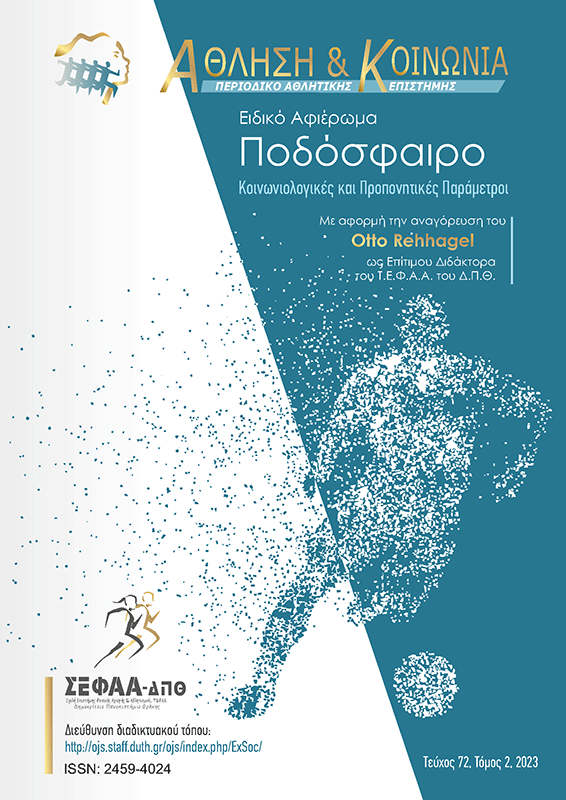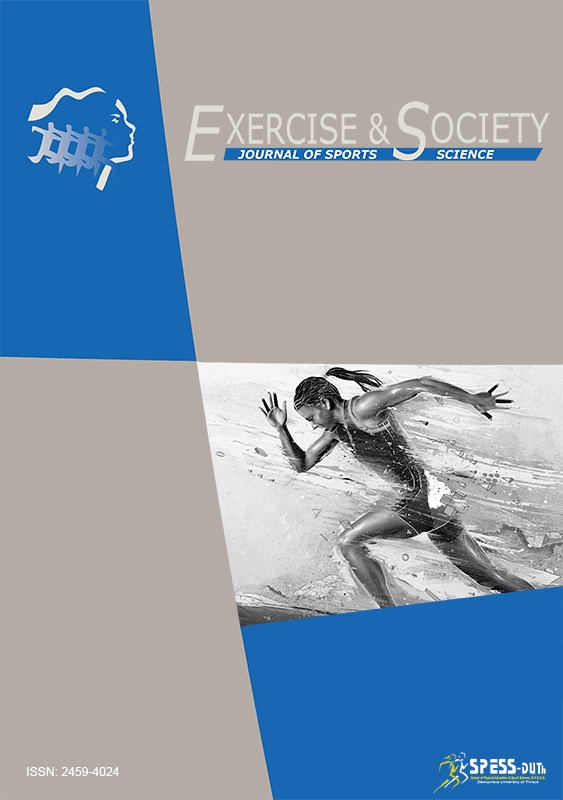Measures of subjective well-being and competitive readiness in modern soccer
Keywords:
external load, subjective well-being, competitive readiness, soccerAbstract
The exact determination of the external load of a training session or a match and the internal body response to it are critical parameters in modern soccer. In addition, the athletes' sense of subjective well-being and their competitive readiness should also be regularly evaluated and taken into account in order to successfully plan the training sessions. For this purpose, special questionnaires, and blood parameters such as muscle enzymes, hormones, inflammatory markers and immune factors as well as physical performance tests are taken into account. Nowadays, the use of advanced technology along with scientific knowledge are applied in order to prevent injuries and optimize performance.
References
Fessi, MS., Nouira, S., Dellal, A., Owen, A., Elloumi, M., Moalla, W. (2016). Changes of the psychophysical state and feeling of wellness of professional soccer players during pre-season and in-season periods. Res Sports Med, 24(4): 375-386.
Gabbet, TJ., Nassis, GP., Oetter, E., Pretorius, J., Johnston, N., Medina, D., Rodas, G., Myslinski, T., Howells, D., Beard, A., Ryan, A. (2017). The athlete monitoring cycle: a practical guide to interpreting an applying training monitoring data. Br J Sports Med, (51)20: 1451-1452.
Gaudino, P., Iain, FM., Strudwick, AJ., Hawkins, RD., Alberti, G., Atkinson, G., Gregson, W. (2015). Factors influencing perception of effort (session RPE) during elite soccer training. Int J Sports Physiol Perform, 10(7): 860-864.
Hooper, SL., Mackinnon, LT. (1995). Monitoring overtraining in athletes. Sports Med, 20(5): 321-327.
Μoalla, W., Fessi, MS., Farhat, F., Nouira, S., Wong, DP., Dupont, G. (2016). Relationship between daily training load and psychometric status of professional soccer players. Res Sports Med, 24(4): 387-394.
Νassis, GP., Gabbett, TJ. (2017). Is workload associated with injuries and performance in elite football? A call for action. Br J Sports Med, 51: 486-487.
Rabbani, A., Clemente, FM., Kargafard, M., Chamari, K. (2019). Match-fatigue time-course assessment over four days: usefulness of the Hooper Index and heart rate variability in professional soccer players. Frontiers Physiol, 10: 109-118.
Saw AE, Main LC, Gastin PB. (2016). Monitoring the athlete training response: subjective self-reported measures trump commonly used objective measures: a systematic review. Br J Sports Med, 50: 281-291.
Selmi O, Querqui I, Levitt D, Marzouki H, Knechtle B, Nikolaidis PT, Bouassida A. (2022). Training, psychometric status, biological markers and neuromuscular fatigue in soccer. Biol Sport, 39(2): 319-327.
Silva, R., Clemente, FM., Gonzales-Fernandez, FT., Bernardo, A, Ardigo LP. (2021). Weekly variations of short-duration maximal jumping performance in soccer players: exploring relationships with accumulated training load and match demands. Frontiers Physiol, 19(12):690353.
Thorpe RT, Strudwick AJ, Buchheit M, Atkinson G, Drust B, Gregson W. (2015). Monitoring fatigue during the in-season competitive phase in elite soccer players. Int J Sports Physiol Perform.
Downloads
Published
How to Cite
Issue
Section
License
Authors who publish with this journal agree to the following terms:
a. Authors retain copyright and grant the journal right of first publication with the work simultaneously licensed under a Creative Commons Attribution License that allows others to share the work with an acknowledgement of the work's authorship and initial publication in this journal.
b. Authors are able to enter into separate, additional contractual arrangements for the non-exclusive distribution of the journal's published version of the work (e.g., post it to an institutional repository or publish it in a book), with an acknowledgement of its initial publication in this journal.
c. Authors are permitted and encouraged to post their work online (e.g., in institutional repositories or on their website) prior to and during the submission process, as it can lead to productive exchanges, as well as earlier and greater citation of published work (See The Effect of Open Access).



